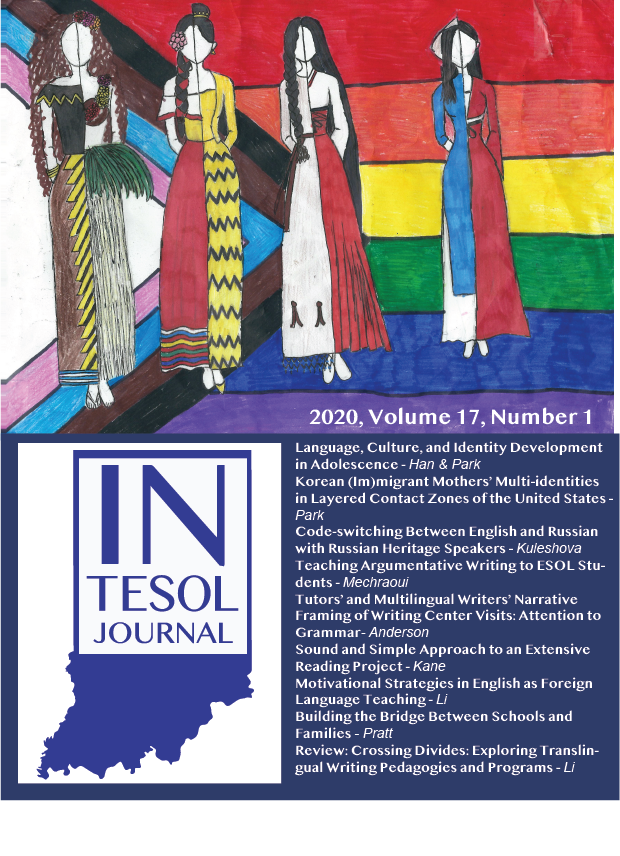Building the Bridge Between Schools and Families through Assessment of Young English Language Learners
DOI:
https://doi.org/10.18060/23731Abstract
Teachers of English Language Learners have a unique opportunity to connect with families through observation, documentation, and assessment of these children. Using a developmentally appropriate and asset-based approach, assessment information can be collected and shared with families to engage them in the learning process. This article provides the practical steps of using a variety of primarily formative assessment methods by which teachers of ELL's can build this vital bridge to families successfully.
References
Babaee, M., & Mereseini, T. (2013). E-portfolios: a new trend in formative writing assessment. International Journal of Modern Education Forum, 2(2), 49-56.
Black, P. & D. Wiliam (1998). Assessment and classroom learning. Assessment in Education, 5 (1), 1-12. DOI: 10.1080/0969595980050102
Brenna, B., Myburgh, J., Aubichon, S., Baker, A. Fee, R. (2017). Exploring the use of interest inventories with elementary students: A rich foundation for literacy curriculum making. The Reading Professor, 39(1). Available at: https://scholar.stjohns.edu/thereadingprofessor/vol39/iss1/6
Cartwright, C.A. & Ward, C.B. (1982). Observation techniques. Journal of Children in Contemporary Society, 14(4), 19-29. http://dx.doi.org/10.1300/J274v14n04_04
Choi, N., Chang, M., Kim, S., & Reio, T. G. (2015). A structural model of parent involvement with demographic and academic variables. Psychology in the Schools, 52, 154–167. https://doi-org.pnw.idm.oclc.org/10.1002/pits.21813
Chrispeels, J. H., & Rivero, E. (2000). Engaging Latino families for student success: Understanding the process and impact of providing training to parents. Paper presented at the Annual Meeting of the American Educational Research Association, New Orleans, LA.
Davies, A. (2000) Making Classroom Assessment Work. Merville, BC: Connections Publishing
Dollaghan, C. A., Horner, E. A. (2011). Bilingual language assessment: A meta-analysis of diagnostic accuracy. Journal of Speech, Language, and Hearing Research, 54, 1077–1088. http://dx.doi.org/10.1044/1092-4388(2010/10-0093)
Good, M., Masewicz, S., & Vogel, L. (2010). Latino english language learners: Bridging achievement and cultural gaps between schools and families. Journal of Latinos & Education, 9(4), 321-339. http://dx.doi.org/10.1080/15348431.2010.491048
Goodman, Y. M. (1985). Kidwatching: Observing children in the classroom. In A. Jagger and M. T. Smith-Burke (Eds.), Observing the Language Learner (pp. 9-18). Urbana: NCTE and IRA.
Henry, S. F., Mello, D., Avery, M. P., Parker, C., & Stafford, E. (2017). Home language survey data quality self -assessment (REL 2017–198). Washington, DC: U.S. Department of Education, Institute of Education Sciences, National Center for Education Evaluation and Regional Assistance, Regional Educational Laboratory Northeast & Islands. Retrieved from http://ies.ed.gov/ncee/edlabs
Jimerson, S.R., Sharkey, J.D., Nyborg, V. (2004). Strength-based assessment and school psychology: A summary and synthesis. Contemporary School Psychology 9, 9–19. http://dx.doi.org/10.1007/BF03340903
López, G. R. (2001). On whose terms? Understanding involvement through the eyes of migrant parents. Paper presented at the Annual Meeting of the American Educational Research Association, Seattle, WA.
Marinak, B. A., Malloy, J. B., Gambrell, L. B., & Mazzoni, S. A. (2015). Me and my reading profile: A tool for assessing early reading motivation. The Reading Teacher, 69(1), 51-62. http://dx.doi.org/10.1002/trtr.1362
Marcon, R. A. (1999). Positive relationships between parent school involvement and public school inner-city preschoolers’ development and academic performance. School Psychology Review, 28(3), 395–412. http://dx.doi.org/10.1080/02796015.1999.12085973
Navarrete, C., Wilde, J., Nelson, C., Martinez, R., and Hargett, G. (1990). Informal assessment in educational evaluation: Implications for bilingual education programs. FOCUS Occasional Papers in Bilingual Education. Washington, DC: NCBE.
NAEYC (2009). Retrieved from http://www.naeyc.org/sites/default/files/globally-shared/downloads/PDFs/resources/position-statements/diversity.pdf
NCES (2016). Retrieved from: https://nces.ed.gov/programs/coe/indicator_cgf.asp
O'Malley, J.M., & Valdez Pierce, L. (1996). Authentic assessment for English language learners: Practical approaches for teachers. New York: Addison-Wesley.
Passarelli, A., Hall, E., & Anderson, M. (2010). A strengths-based approach to outdoor and adventure education: Possibilities for personal growth. Journal of Experiential Education, 33(2), 120–135. http://dx.doi.org/10.1177/105382591003300203
Rose, H. (2006, Winter). Asset-based development for child and youth care. Reclaiming Children and Youth, 14(4), 236-240. Retrieved from http://www.iicrd.org/sites/ default/files /resources/Asset-based_Development_for_child_and_youthcare_0.pdf
Shao-Ting, A. H., & Heng-Tsung, D. H. (2010). E-portfolio-based language learning and assessment. The International Journal of Learning, 17(1), 313-336.
Souto-Manning, M., & Ceruvu, R. (2016). Challenging and appropriating discourses of power: Listening to and learning from successful early career early childhood teachers of color. Equity and Excellence in Education, 49(1), 9-26. http://dx.doi.org/10.1080/10665684.2015.1121793
Stefanakis, E. (2002) Multiple Intelligences and Portfolios. Portsmouth: Heinemann.
Valencia, R.R., ed. 1993. Chicano school failure and success: Research and policy agendas for the 1990s. Bristol, PA: Falmer Press. (ERIC Document Reproduction Service No. ED387279).
WIDA. (2014). The early English language development standards: 2.5–5.5 years. Madison, WI: Board of Regents of the University of Wisconsin System.
Wilder, S. (2014). Effects of parent involvement on academic achievement: a meta-synthesis. Educational Review, 66, 377–397. https://doi-org.pnw.idm.oclc.org/10.1080/00131911.2013.780009
Zehr, M. A. (2010). Home-language surveys for ells under fire. Education Week, 29(22), 1.
Downloads
Published
Issue
Section
License
Copyright (c) 2020 David Pratt

This work is licensed under a Creative Commons Attribution-NonCommercial 4.0 International License.


